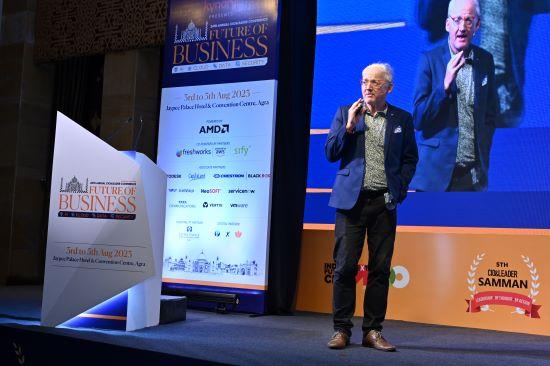
Drawing parallels with the democratization of AI, Toby cited the rapid dissemination of technologies like ChatGPT, enabling billions to influence the technology's trajectory through their creativity and innovation.
Imagine a future where your gadgets understand you like a close friend. Professor Toby Walsh, Chief Scientist at the University of New South Wales AI Institute, predicts that this is the path AI is heading. In a candid conversation with CIO&Leader at their Annual Conference, he shared how AI is not merely a tool but the driving force that will elevate our technology into something extraordinary. It's not just about cutting-edge tech; it's poised to boost the economy by a remarkable 15-20%!
One of the significant challenges for generative AI is its struggle to replicate the human touch or empathy. This essence truly differentiates human-to-human interactions from machine-to-human engagements. While this challenge remains, it is also seen as an untapped potential.
Prof. Walsh, who is known for his work in areas such as automated reasoning, AI ethics, multi-agent systems, and AI for social good, envisions a future where AI models will have cognitive empathy, offering rich, continuous learning interactions similar to human experiences.
This transformation will not only enhance conversational intelligence but also enable AI and Generative AI to comprehend us similarly to a human friend, not only solving complex problems but understanding us at a personal level.
Making tech accessible to all
Professor Walsh emphasized that AI is well on its way to becoming our primary mode of interaction with technology, giving it an almost 'personality.' Drawing a parallel between this AI democratization and the rapid rise of instant conversational search technologies like ChatGPT, he emphasized how they enable individuals and organizations to shape the direction of tech.
Looking beyond today's AI models, the author of 2062: The World that AI Made likened this revolution to the era when personal computers and innovative apps like VisiCalc emerged. He encouraged the industry to think beyond the obvious and explore new, amazing applications for AI that we've yet to uncover.
Data makes all the difference
Amidst this AI evolution, data emerged as the lifeblood of AI. It's what makes AI models successful. Large news organizations like Bloomberg and Reuters thrive on it, leveraging data to develop incredibly specialized AI models, showcasing the critical role of data in driving AI technologies.
(See: Generative AI: Are Enterprises Ready?)
A balancing act for a better tomorrow
While AI holds immense potential, Professor Walsh cautioned against overestimating its current capabilities. He highlighted the need for continuous research to ensure AI truly understands and reasons like a human. Responsible AI use and addressing biases in AI models are critical challenges that we must address for a brighter AI-powered future.
Professor Walsh urged the industry to collectively steer AI towards a brighter future that benefits us all. He stressed the importance of embracing the evolving AI landscape with wisdom, foresight, and a strong ethical compass. Enterprise and their leaders are worried about keeping their data safe when they use AI tools like Bard and ChatGPT. They need to plan and test really well to use AI the right way. The potential of AI is undoubtedly promising, provided we leverage this technological revolution in the right direction.
To overcome these challenges, business and technology leaders must construct an AI roadmap to understand how this technology will help their unique business goals.

 In
In
Add new comment